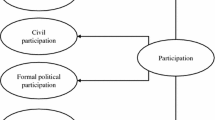Abstract
Previous explanations of mass participation have often focused on sociodemographic characteristics to the neglect of social psychological factors. This study takes a new path in thinking about the role of psychological factors in participation. Specifically, we hypothesize that individual propensities regarding conflict will influence the likelihood of participating in political affairs. We develop more specific expectations for how the avenue of participation interacts with individual propensities toward conflict to influence participation. Using secondary analysis of the Citizen Participation Study (CPS), we show that conflict avoidance is significantly and inversely related to participation in some kinds of activities, consistent with our expectations. Thus, both individual propensities and the political context influence participation. This study provides a new understanding of which individuals participate in political affairs and which avenues they choose. This suggests a need to reconsider the role of psychological factors in models of participation.
Similar content being viewed by others
REFERENCES
Berelson, Bernard R., Paul Lazarsfeld, and William N. McPhee (1954). Voting. Chicago: University of Chicago.
Berscheid, Ellen (1985). Interpersonal attraction. In G. Lindzey and E. Aronson (eds.), Handbook of Social Psychology, 3rd ed. New York: Random House.
Brady, David W., and Sean M. Theriault (1998). A reassessment of who's to blame: a positive case for the public evaluation of Congress. Paper presented at the Hendricks Symposium on Public Disaffection with the U.S. Political System, October 9–10, 1998, University of Nebraska-Lincoln.
Brown, Steven D. (1982). The explanation of particularized contacting: a comparison of models. Urban Affairs Quarterly 18(2): 217–234.
Byrne, Donn. (1971). The Attraction Paradigm. New York: Academic Press.
Cappella, Joseph N., and Kathleen Hall Jamieson (1997). Spiral of Cynicism: The Press and the Public Good. New York: Oxford University Press.
Conway, M. Margaret (1991). Political Participation in the United States. Washington, DC: CQ Press.
Dahl, Robert A. (1971). Polyarchy: Participation and Opposition. New Haven, CT: Yale University Press.
Davidson, Roger H., David M. Kovenock, and Michael O'Leary (1968). Congress in Crisis: Politics and Congressional Reform. Belmont, CA: Wadsworth.
Durr, Robert H., John B. Gilmour, and Christina Wolbrecht (1997). Explaining congressional approval. American Journal of Political Science 41(1): 175–207.
Eagly, Alice H., and Shelly Chaiken (1993). The Psychology of Attitudes. New York: HBJ.
Elving, Ronald D. (1994). Brighter lights, wider windows: presenting Congress in the 1990s. In T. E. Mann and N. J. Ornstein (eds.), Congress, the Press, and the Public. Washington, DC: American Enterprise Institute and The Brookings Institution.
Fallows, James (1996). Breaking the News: How the Media Undermine American Democracy. New York: Pantheon Books.
Funk, Carolyn L. (1998). Dr. Jekyll and Mr. Hyde: public views of debate in the political system. Paper presented at the Hendricks Symposium on Public Disaffection with the U.S. Political System, October 9–10, 1998, University of Nebraska-Lincoln.
Glynn, Carroll J., Andrew F. Hayes, and James Shanahan (1997). Perceived support for one's opinions and willingness to speak out: a meta-analysis of survey studies on the “spiral of silence.” Public Opinion Quarterly 61(3): 452–463.
Hibbing, John R., and Elizabeth Theiss-Morse (1995). Congress as Public Enemy. New York: Cambridge University Press.
Hill, Kim Quaile, and Jan E. Leighley (1996). Political parties and class mobilization in contemporary United States elections. American Journal of Political Science 40(3): 787–804.
Huckfeldt, Robert, and John Sprague (1987). Networks in context: the social flow of political information. American Political Science Review 81(4): 1197–1216.
Jankowski, Thomas B., and John M. Strate (1995). Modes of participation over the adult life span. Political Behavior 17(1): 89–106.
Leighley, Jan E. (1995). Attitudes, opportunities and incentives: a field essay on political participation. Political Research Quarterly 48(1): 181–209.
Leighley, Jan E. (1996). Group membership and the mobilization of political participation. Journal of Politics 58(2): 447–463.
Lipset, Seymour M. (1981). Political Man: The Social Bases of Politics. New York: The Free Press.
Mansbridge, Jane J. (1980). Beyond Adversary Democracy. New York: Basic Books.
Maslach, Christina, R. T. Santee, and C. Wade (1987). Individuation, gender role, and dissent: personality mediators of situational forces. Journal of Personality and Social Psychology 53(6): 1088–1093.
Milbrath, Lester (1965). Political Participation. Chicago: Rand McNally.
Mladenka, Kenneth R. (1977). Citizen demand and bureaucratic response: direct dialing democracy in a major American city. Urban Affairs Quarterly 12(3): 273–290.
Nie, Norman, Jane Junn, and Kenneth Stehlik-Barry (1996). Education and Democratic Citizenship in America. Chicago: University of Chicago Press.
Noelle-Neumann, Elisabeth (1993). The Spiral of Silence: Public Opinion—Our Social Skin, 2nd ed. Chicago: University of Chicago.
Pennock, James R. (1979). Democratic Political Theory. Princeton, NJ: Princeton University Press.
Petty, Richard E., and John T. Cacioppo (1981). Attitudes and Persuasion: Classic and Contemporary Approaches. Dubuque, IA: Em. C. Brown.
Ragsdale, Lyn, and Jerrold G. Rusk (1993). Who are nonvoters? Profiles from the 1990 Senate elections. American Journal of Political Science 37(3): 721–746.
Rosenberg, Morris (1954–55). Some determinants of political apathy. Public Opinion Quarterly 18(4): 349–366.
Rosenstone, Steven, and John M. Hansen (1993). Mobilization, Participation, and Democracy in America. New York: Macmillan.
Sanders, Lynn M. (1997). Against deliberation. Political Theory 25(3): 347–376.
Schudson, Michael (1998). The Good Citizen. New York: Free Press.
Snyder, Mark (1987). Public Appearances/Private Realities: The Psychology of Self-Monitoring. New York: Freeman.
Tannen, Deborah (1998). The Argument Culture. New York: Random House.
Uslaner, Eric M. (1993). The Decline of Comity in Congress. Ann Arbor: University of Michigan.
Verba, Sidney, and Norman H. Nie (1972). Participation in America: Political Democracy and Social Equality. New York: Harper & Row.
Verba, Sidney, Kay L. Schlozman, and Henry E. Brady (1995). Voice and Equality: Civic Voluntarism in American Politics. Cambridge, MA: Harvard University Press.
Whitney, Kristina, L. M. Sagrestano, and Christina Maslach (1994). Establishing the social impact of individuation. Journal of Personality and Social Psychology 66(6): 1140–1153.
Wolfinger, Raymond E., and Steven J. Rosenstone (1980). Who Votes? New Haven, CT: Yale University Press.
Author information
Authors and Affiliations
Rights and permissions
About this article
Cite this article
Ulbig, S.G., Funk, C.L. Conflict Avoidance and Political Participation. Political Behavior 21, 265–282 (1999). https://doi.org/10.1023/A:1022087617514
Issue Date:
DOI: https://doi.org/10.1023/A:1022087617514




